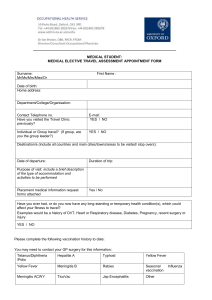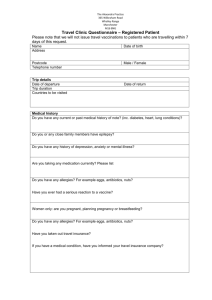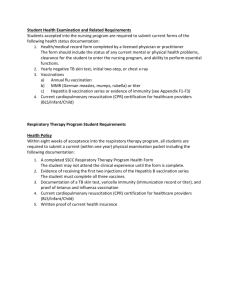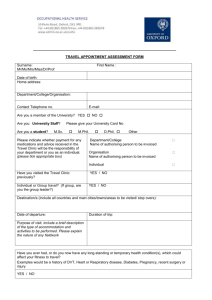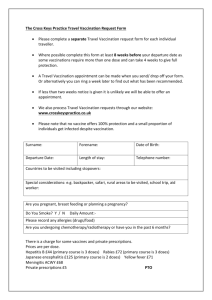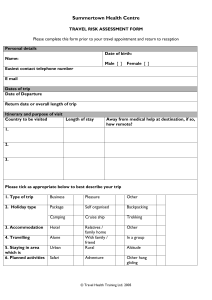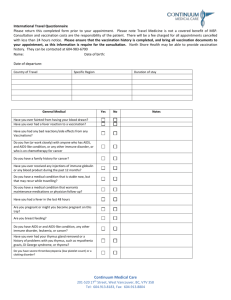WHAT COULD YOU PICK UP
advertisement
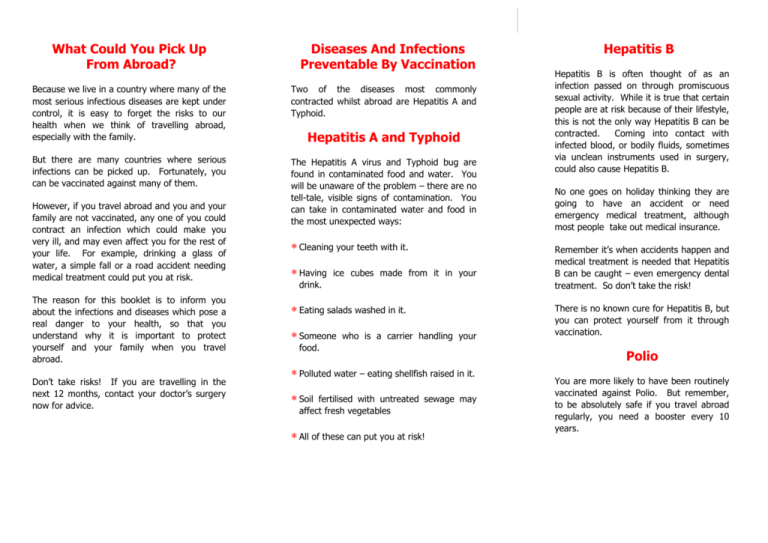
What Could You Pick Up From Abroad? Diseases And Infections Preventable By Vaccination Because we live in a country where many of the most serious infectious diseases are kept under control, it is easy to forget the risks to our health when we think of travelling abroad, especially with the family. Two of the diseases most commonly contracted whilst abroad are Hepatitis A and Typhoid. But there are many countries where serious infections can be picked up. Fortunately, you can be vaccinated against many of them. The Hepatitis A virus and Typhoid bug are found in contaminated food and water. You will be unaware of the problem – there are no tell-tale, visible signs of contamination. You can take in contaminated water and food in the most unexpected ways: However, if you travel abroad and you and your family are not vaccinated, any one of you could contract an infection which could make you very ill, and may even affect you for the rest of your life. For example, drinking a glass of water, a simple fall or a road accident needing medical treatment could put you at risk. The reason for this booklet is to inform you about the infections and diseases which pose a real danger to your health, so that you understand why it is important to protect yourself and your family when you travel abroad. Don’t take risks! If you are travelling in the next 12 months, contact your doctor’s surgery now for advice. Hepatitis A and Typhoid Cleaning your teeth with it. Having ice cubes made from it in your drink. Eating salads washed in it. Someone who is a carrier handling your food. Polluted water – eating shellfish raised in it. Soil fertilised with untreated sewage may affect fresh vegetables All of these can put you at risk! Hepatitis B Hepatitis B is often thought of as an infection passed on through promiscuous sexual activity. While it is true that certain people are at risk because of their lifestyle, this is not the only way Hepatitis B can be contracted. Coming into contact with infected blood, or bodily fluids, sometimes via unclean instruments used in surgery, could also cause Hepatitis B. No one goes on holiday thinking they are going to have an accident or need emergency medical treatment, although most people take out medical insurance. Remember it’s when accidents happen and medical treatment is needed that Hepatitis B can be caught – even emergency dental treatment. So don’t take the risk! There is no known cure for Hepatitis B, but you can protect yourself from it through vaccination. Polio You are more likely to have been routinely vaccinated against Polio. But remember, to be absolutely safe if you travel abroad regularly, you need a booster every 10 years. Meningitis Cholera Meningitis is appearing more often in the news in the UK. Fortunately there is a vaccine against one of the more serious strains. If you travel to Africa, The Middle East and some parts of Asia you are at increased risk – but you can protect yourself through vaccination. Cholera is caught by eating food and drinking water infected with the cholera virus. No cholera vaccine is currently available in the UK. The World Health Organisation says vaccination against cholera is not legally necessary to enter any country. Tetanus Speak to your nurse about precautionary measures whilst you are travelling abroad. Tetanus can be found all over the world, even in the UK. So this is one infection you should keep protected from at all times. Be sure to keep your injections up-to-date and contact your doctor’s surgery if you are in doubt. Yellow Fever Some countries will not let you enter unless you have proof that you have had a yellow fever vaccination. Talk to your travel agent or doctor; you could risk having your trip ruined if you are not protected. Diphtheria Diphtheria is a serious infection. It is still a risk in certain parts of the world, including Russia an the Ukraine. A low dose diphtheria (plus Tetanus) vaccine can be given. Rabies Rabies is a deadly disease which is found in many countries. If you plan to visit rural areas in which medical help is not readily available and where rabies is prevalent, you could seriously consider vaccination before you go. If you would like advice on travel vaccination, please do not hesitate to contact your doctor’s surgery. You should ask about travel vaccinations at least eight weeks before you intend to travel abroad. Don’t take risks, or you could be bringing back more than just a case of dirty clothes. Protect yourself and your family before you travel. Make sure the only thing you’re carrying back is your suitcase.
